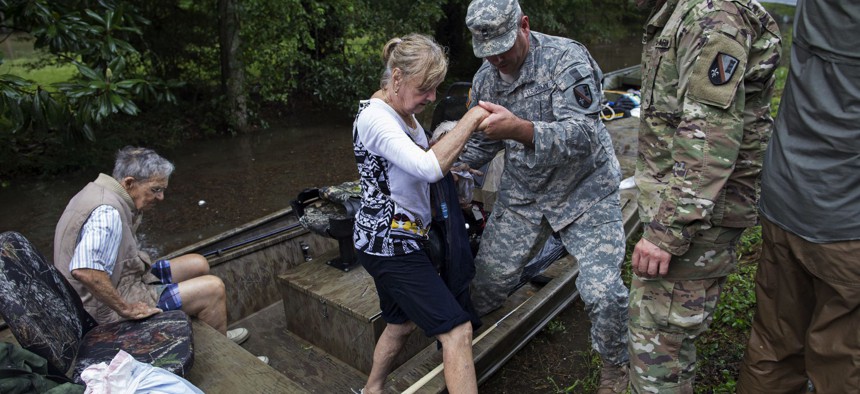An Important Emergency Response Scenario for Every State and Local Government

Members of the Louisiana Army National Guard rescue people from rising floodwater near Walker, La. Max Becherer / AP Photo

Connecting state and local government leaders
Can your agency effectively respond to a disaster amid a widespread telecommunications outage?
Each real-life disaster situation offers opportunities for various levels of government and other stakeholders to test their level of preparedness and response. This month’s unprecedented flooding in Louisiana, which inundated parts of 20 parishes, damaged at least 60,000 homes, killed 13 people and required the rescuing of more than 20,000 people, is no exception.
As the full scope of the devastation in Louisiana continues to come into focus—the Red Cross has said the flooding, the result of days of intense rainfall, is the worst U.S. disaster since Superstorm Sandy in 2012—there’s a relatively minor footnote from the immediate disaster response that state and local government agencies should pay careful attention to.
In Baton Rouge, an AT&T telecommunications switching station was temporarily knocked offline due to high water, which prevented thousands of people from being able to make telephone calls, access email and other communications using their cellphones, just when the needed them the most.
That included members of Louisiana Gov. John Bel Edwards’ staff, state employees and first responders—individuals who shouldn’t go without telecommunications access during a rapidly unfolding disaster situation.
During a press conference on Aug. 14, Edwards told reporters that AT&T was sending in an out-of-state mobile switching facility as part of its efforts to restore service, which the governor said was causing problems for state and local agencies responding to the flooding, The Times-Picayune reported at the time. Following Superstorm Sandy, cellphone carriers dispatched mobile units to impacted areas to get networks functional again.
During the most recent disaster, Louisiana state and local authorities urged those without cellphone service to use social media and other communications means to reach authorities—and that was assuming those who were knocked offline somehow could find a way to find a connection.
Cell service for AT&T customers, thankfully, was mostly restored across Louisiana by Aug. 15, Wireless Week reported.
But the Louisiana AT&T outage raises an important emergency preparedness question that every state and local government agency needs to ask itself: Regardless of the disaster, what is the backup plan if the cellphones used by government officials, agency employees and first responders suddenly stop working just as the community needs them the most? What if there isn’t a backup plan?
These are important questions to ask. Emergency management and preparedness professionals certainly ponder such scenarios. But public officials should seriously ponder these what-ifs, too.
Even when cellphone networks aren’t totally knocked offline during disasters due to equipment failures, they can be bogged down in emergencies due to high call volume, something that happened in the wake of the April 2013 Boston Marathon bombing and the August 2011 East Coast earthquake.
Some state and local officials have recognized the vulnerabilities of telecommunications infrastructure during emergencies and are looking to boost resiliency.
Last year in Southern California, officials at Los Angeles City Hall took action to require stronger seismic design standards for cellphone towers that aim to keep cell networks functional following a major earthquake. L.A. was the first city to pass such seismic standards for telecommunications infrastructure.
"Here we said, we want more than life safety, we want cell towers that will continue to function after the earthquake, because our society needs cellular communication," Lucy Jones, a seismologist advising L.A. Mayor Eric Garcetti on earthquake resiliency policy, said in May 2015.
Michael Grass is Executive Editor of Government Executive’s Route Fifty and is based in Seattle.

NEXT STORY: The State and Local Regulatory Predicament Middle-Market Companies Face



